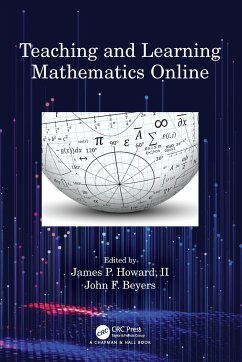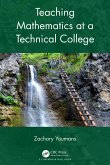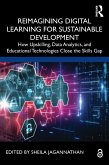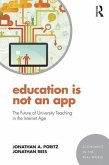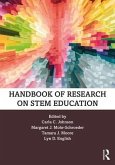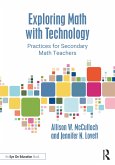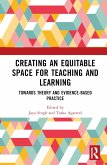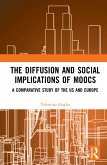Online education has become a major component of higher education worldwide. In mathematics and statistics courses, there exists a number of challenges that are unique to the teaching and learning of mathematics and statistics in an online environment. These challenges are deeply connected to already existing difficulties related to math anxiety, conceptual understanding of mathematical ideas, communicating mathematically, and the appropriate use of technology.
Teaching and Learning Mathematics Online bridges these issues by presenting meaningful and practical solutions for teaching mathematics and statistics online. It focuses on the problems observed by mathematics instructors currently working in the field who strive to hone their craft and share best practices with our professional community. The book provides a set of standard practices, improving the quality of online teaching and the learning of mathematics. Instructors will benefit from learning new techniquesand approaches to delivering content.
Features
Based on the experiences of working educators in the field
Assimilates the latest technology developments for interactive distance education
Focuses on mathematical education for developing early mathematics courses
Teaching and Learning Mathematics Online bridges these issues by presenting meaningful and practical solutions for teaching mathematics and statistics online. It focuses on the problems observed by mathematics instructors currently working in the field who strive to hone their craft and share best practices with our professional community. The book provides a set of standard practices, improving the quality of online teaching and the learning of mathematics. Instructors will benefit from learning new techniquesand approaches to delivering content.
Features
Based on the experiences of working educators in the field
Assimilates the latest technology developments for interactive distance education
Focuses on mathematical education for developing early mathematics courses
"Covering such issues as Course Design, Student Interaction, Using Technology, Teacher Education, and a Commentary (Online; Mathematics Education, the Good, The Bad, and the General Overview), Teaching and Learning Mathematics Online is an ideal addition to college and university library Mathematics Education collections and as a curriculum textbook for Applied Mathematics supplemental studies lists."
-Midwest Book Review
"This edited volume is particularly timely in the current era of remote teaching and learning. Online education predated the necessity for educational change in the face of a pandemic and is likely to continue-and perhaps expand-in coming years. Many students find learning mathematics difficult, however, and doing so remotely and online only adds to the difficulty. This book is aimed at mathematics teachers, primarily those in higher education, but will also be helpful to secondary school teachers. Contributing authors present examples of teaching mathematics in multiple dimensions or learning modes and in several mathematical disciplines. The 19 substantive chapters are organized in four parts: "Course Design," "Using Technology," "Student Interaction," and "Teacher Education." Each chapter is written by one or several specialists in the given area. The contributors are affiliated with a broad range of international institutions at all levels of higher education, from community college to research university. Each chapter provides substantial references. Part 5 ("Commentary") comprises a single concluding chapter summarizing the main issues and aptly titled "Online Mathematics Education: The Good, the Bad, and the General Overview." This book will be a useful addition to libraries supporting mathematics departments and colleges of education."
-Choice Review
"Teaching and Learning Mathematics Online is a welcome and timely addition to the mathematics education literature. In an era of increasing disruption to students' education, online learning has become an important, albeit challenging, means of teaching and learning mathematics. As the authors indicate, the rapid developments in technology will escalate the opportunities afforded by online learning. Educators are thus striving to provide the most appropriate and stimulating online learning experiences for their students.
Teaching and Learning Mathematics Online comes to the fore, providing a rich source of experiences across a range of topics including approaches to course design, managing online discussions, establishing 'Self-Help Kiosks', and dealing with students' mathematics anxiety. I highly recommend this book for mathematics educators looking for sound, research supported ways of delivering mathematics learning online in novel, appealing, and powerful ways."
-Lyn D. English, Professor of STEM Education, Faculty of Education, Queensland University of Technology
"As one of the pioneers of Online Mathematics Education, I am very happy to see such a comprehensive book in this area. It should be very useful for mathematics educators, as one can see different tools 'acting' in what I have called the transforming mathematics classroom.
After the COVID-19 crisis, this book has become even more relevant. Mathematics Education may be very different from now on. In any scenario, it seems likely that this book will be a mandatory resource for developing future research in the field. Congratulations to authors from all over the world who helped to build such a book for our community."
-Marcelo C. Borba, Professor in Mathematics Department, São Paulo State University (UNESP) and Associate Editor of ZDM, an International journal of Mathematics Education
"What do you get when gifted teachers decide to write a book? You get a book that speaks to the reader and inspires learning - as opposed to a 'text' that seeks to show off the knowledge of the authors. This book was written by gifted teachers speaking to the student and learner - only. The result is a clear and uncluttered path to knowledge."
-Alyson Muff, University of Maryland Global Campus
"For those tasked with the often challenging position of teaching mathematics online, this book serves as a how-to guide filled with research-based best practices. Mathematics educators will find a variety of instructional ideas to implement in their classrooms, whether they be fully online or hybrid, addressing the most pressing issues we face when teaching mathematics."
-Tiffany DePriter, University of Maryland Global Campus
"If you are looking for a realistic, practical how-to compendium of real-world math classroom advice to help you and your students succeed...look no further. This outstanding compendium is it!"
-Mary Dereshiwsky, University of Maryland Global Campus
-Midwest Book Review
"This edited volume is particularly timely in the current era of remote teaching and learning. Online education predated the necessity for educational change in the face of a pandemic and is likely to continue-and perhaps expand-in coming years. Many students find learning mathematics difficult, however, and doing so remotely and online only adds to the difficulty. This book is aimed at mathematics teachers, primarily those in higher education, but will also be helpful to secondary school teachers. Contributing authors present examples of teaching mathematics in multiple dimensions or learning modes and in several mathematical disciplines. The 19 substantive chapters are organized in four parts: "Course Design," "Using Technology," "Student Interaction," and "Teacher Education." Each chapter is written by one or several specialists in the given area. The contributors are affiliated with a broad range of international institutions at all levels of higher education, from community college to research university. Each chapter provides substantial references. Part 5 ("Commentary") comprises a single concluding chapter summarizing the main issues and aptly titled "Online Mathematics Education: The Good, the Bad, and the General Overview." This book will be a useful addition to libraries supporting mathematics departments and colleges of education."
-Choice Review
"Teaching and Learning Mathematics Online is a welcome and timely addition to the mathematics education literature. In an era of increasing disruption to students' education, online learning has become an important, albeit challenging, means of teaching and learning mathematics. As the authors indicate, the rapid developments in technology will escalate the opportunities afforded by online learning. Educators are thus striving to provide the most appropriate and stimulating online learning experiences for their students.
Teaching and Learning Mathematics Online comes to the fore, providing a rich source of experiences across a range of topics including approaches to course design, managing online discussions, establishing 'Self-Help Kiosks', and dealing with students' mathematics anxiety. I highly recommend this book for mathematics educators looking for sound, research supported ways of delivering mathematics learning online in novel, appealing, and powerful ways."
-Lyn D. English, Professor of STEM Education, Faculty of Education, Queensland University of Technology
"As one of the pioneers of Online Mathematics Education, I am very happy to see such a comprehensive book in this area. It should be very useful for mathematics educators, as one can see different tools 'acting' in what I have called the transforming mathematics classroom.
After the COVID-19 crisis, this book has become even more relevant. Mathematics Education may be very different from now on. In any scenario, it seems likely that this book will be a mandatory resource for developing future research in the field. Congratulations to authors from all over the world who helped to build such a book for our community."
-Marcelo C. Borba, Professor in Mathematics Department, São Paulo State University (UNESP) and Associate Editor of ZDM, an International journal of Mathematics Education
"What do you get when gifted teachers decide to write a book? You get a book that speaks to the reader and inspires learning - as opposed to a 'text' that seeks to show off the knowledge of the authors. This book was written by gifted teachers speaking to the student and learner - only. The result is a clear and uncluttered path to knowledge."
-Alyson Muff, University of Maryland Global Campus
"For those tasked with the often challenging position of teaching mathematics online, this book serves as a how-to guide filled with research-based best practices. Mathematics educators will find a variety of instructional ideas to implement in their classrooms, whether they be fully online or hybrid, addressing the most pressing issues we face when teaching mathematics."
-Tiffany DePriter, University of Maryland Global Campus
"If you are looking for a realistic, practical how-to compendium of real-world math classroom advice to help you and your students succeed...look no further. This outstanding compendium is it!"
-Mary Dereshiwsky, University of Maryland Global Campus

